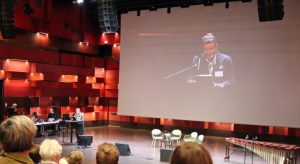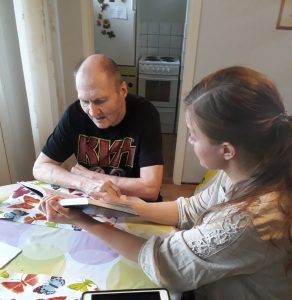Toukokuisessa Tukholmassa järjestettiin 10.5.2022 monialainen ja monitieteinen pohjoismainen kulttuurihyvinvointikonferenssi Nordic Arts & Health Conference, joka kokosi yhteen yli 150 osallistujaa…
Tekijät | Authors
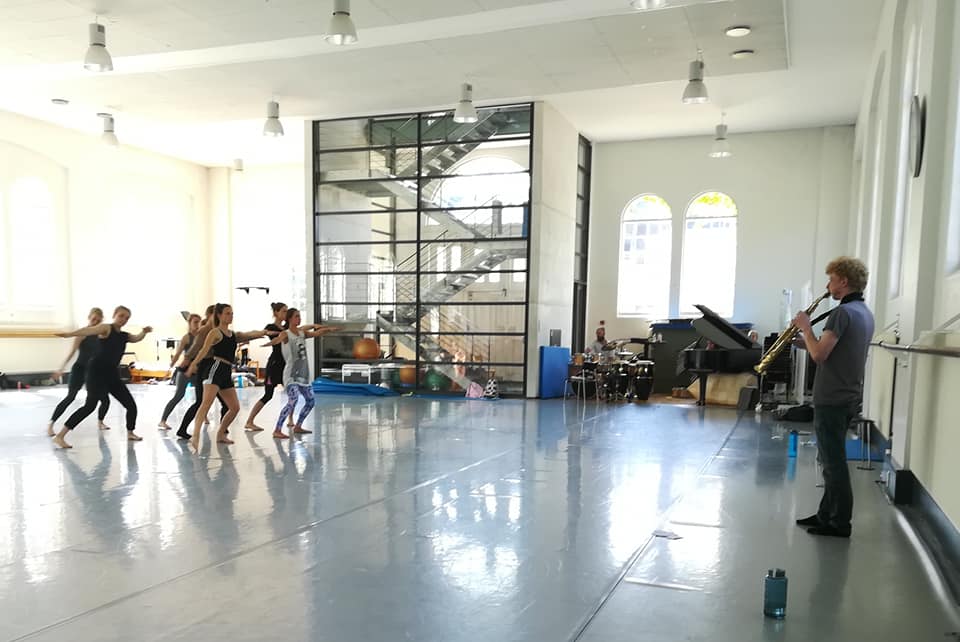
The North Star – Reflecting upon 25 years of Nordplus collaboration
In this article I reflect upon my 25 years engagement with the Nordic Council of Ministers supported Nordplus Higher Education and Nordplus Horizontal programs. I have documented both the activities as well as the outputs from specific Nordplus Higher Education networks. The research and development work includes e.g eight international webinars.
The Nordplus Programme Committee claims:
”Nordplus is the single largest initiative of the Nordic Council of Ministers within the area of education and training. It consists of five individual sub-programmes, involves eight countries and three autonomous regions and spans over the full education area from primary education and kindergartens to higher education and adult learning.” (Nordplus administration 2018.)
I first came to Nordplus in the fall of 1997 when I had discussions with Antonella Storti, who at the time was the Turku Polytechnic, Arts Academy’s International Coordinator. We had recently moved the summer of 1997 from our premises located on Ratapihankatu to the Linnankatu 54 campus. Antonella and I dialogued about creating an interdisciplinary network focusing on visual and performing arts and that led to finding the Nordplus Higher Education funding support structure.
We previously had contact with a leader of the Akureyri School of Visual Arts in Akureyri Iceland, Helgi Vilberg. When I contacted Helgi and suggested Nordplus collaboration he expressed great interest in such a “innovative” concept of performing arts (and specifically dance) and visual arts collaborating. When I informed him, we needed a third Nordic country partner regarding the Nordplus regulations, he suggested I contact the leader of the National Art School of Greenland, the late Arnannguaq Høegh, who was also enthusiastic about what would become the G.I.F.T. Greenland, Iceland, Finland Together Nordplus Higher Education supported network.
G.I.F.T. – collaborative arts projects
From this first G.I.F.T. network and successful student-centred workshops in Iceland, Greenland, and Finland we created a network eventual called Explorations and Collaborations in the Arts. We expanded the network to include 14 university arts programs in with Baltic partners in Lithuania, Latvia, and Estonia as well as additional Nordic partners in Denmark, Norway, and Sweden and Finland. We then had a large geographical sweep all the way from Greenland in the “northwest” to Lithuania in the “southeast”. Over the years, we gained much experience working “out of the box” to develop teaching methods, within collaborative arts projects.
These actions went way beyond the typical “silo” “myopic” approaches that in the past have often occurred in higher education (and in some institutions, still exist). The Nordplus ECA Network partners have gained much experience working with this “out of the box” method to develop teaching methods, within collaborative arts projects.
Nordplus Best Practice Project “Motion, Emotion – Seven Days in Copenhagen”
In 2012 an international team of media students produced the collaborative documentary called “Motion, Emotion – Seven Days in Copenhagen” “Motion, Emotion – Seven Days in Copenhagen” https://www.youtube.com/watch?v=STDQE4heSFs&t=7s . This video was recognized by Nordplus Higher Education as a “best practice” project, and it was dedicated to the memory of Johannes Johansson (1951–2012), Principal of the Royal College of Music, Stockholm, Sweden. Despite his enormous administrative responsibilities and non-stop schedule, he always had time to meet with our ECA delegation when we visited the Royal College of Music. Johannes was the one who told us:
In your ECA Network, you are able to do together, what you are cannot do by yourselves.
The 2014 Vilnius, Lithuania ECA Network international workshop between musicians and dancers was also documented by Estonian student film maker Nadja Girich in ”A Sound of a Movement”.
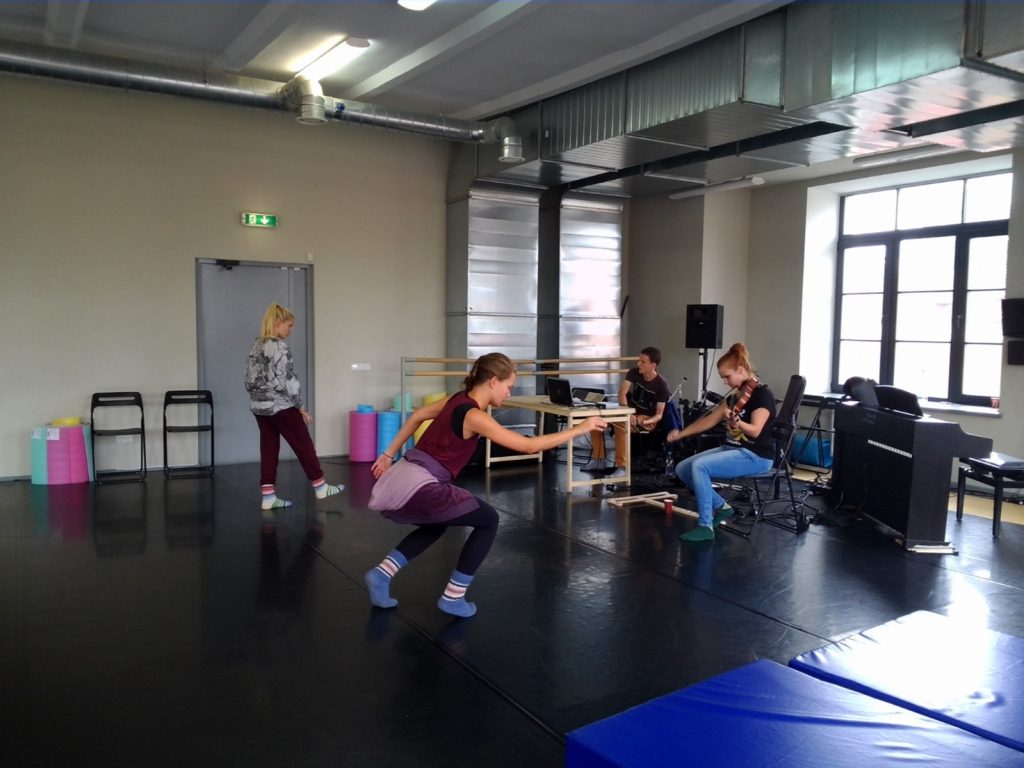
ECA Intensive Course, Lithuanian Academy of Music and Theatre, Vilnius, Lithuania, August 2014.
Creative Arts Pedagogy and the Environment / The CAPE Network
In 2018, the ECA partners agreed it was critical that we use these interdisciplinary experiences and to examine and explore the ways to develop pedagogical or didactic areas of innovation regarding the praxis of arts and the environment in relationship to #ClimateCrisisIsNow. Our ECA partner, the Institute for Learning, University of Greenland, Nuuk, Greenland sent a small delegation of students and teachers to the Turku Arts Academy in the fall of 2018 where continued our dialogue regarding arts and sciences. This visit which was documented in article Arts Pedagogy: A partnership between Greenland and Finland.
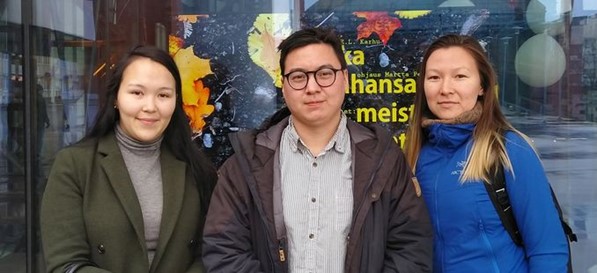
Ane Sofie Løvstrøm , Ivaaq Kriegel and Navarana Kristensen, the Institute for Learning, University of Greenland, Nuuk, Greenland.
We included evidence-based scientific knowledge which informed the participating arts students and teachers and shared the “creative” process with our environmental science colleagues (students and teachers). Creative Arts Pedagogy and the Environment/ The CAPE Network’s core theme was to develop ways in which the arts and science could come together related to environmental and sustainability issues and how to establish new working/teaching methods between these disciplines as we had done in the ECA Network. To quote from the 2019 publication “NORDPLUS Explorations and Collaborations in the Arts. Commemorative 20th Anniversary Publication”:
“Now this ECA interdisciplinary approach has become somewhat commonplace in many of our arts programs, when 20 years ago it was something so new! The NORDPLUS Music and the Association of Nordic Music Academies (ANMA) networks will be having their General Assembly and Thematic Day this coming May 2019. Their new and “innovative” theme is “Exploring the Potential of Cross Arts Collaboration”, something we have actually been DOING for that past 20 years in our NORDPLUS networks. So, 20 years from now, when such arts and science transdisciplinary curricula are commonplace in higher education, we (well, the younger members of our network) will say:” Think how innovative the CAPE Network was in 2019!” (Yoken 2019, 7.)
The CAPE Network was successfully funded by NORDPLUS Higher Education in the spring of 2019. We built a basic website Greenactions and in the fall of 2019 during our first online gathering of the CAPE Network partners we planned a series of workshops and teacher/student mobility exchanges to begin in the Spring of 2020. Covid19 had other plans for us…
CAPE Network Webinar Series 2021
We used most of 2020 online discussing ways we could best implement the CAPE Network’s goal and objectives during the very challenging times we all faced. It was then decided to create a series CAPE Network Webinars to begin in February 2021. These webinars would be captured for YouTube dissemination and would cover a diverse area of topics with invited guests from both the CAPE Network but also outside experts in the field of arts and science.
CAPE Webinar #1: Fern Orchestra, Turku, Finland. February 2021
We began in February 2021 kick-off / 1st NORDPLUS CAPE Network Webinar, with Vespa Laine, Light Artist and founder of the Turku based Fern Orchestra, and Ilona Salonen, Dance Artist who is a Turku UAS, Arts Academy, Dance Program’s graduate, and member of the Fern Orchestra. Vespa introduced the Fern Orchestra and she and Ilona shared their experiences regarding a recent Fern Orchestra contemporary dance performance titled “MARELD”(Swedish for “Sea Fire”). Finland’s first bio-light artwork, Fern Orchestra’s “Breath” was seen at the Lux Helsinki light art festival in January 2019. “Breath” was based upon bioluminescent algae dinoflagellate Alexandrium ostenfeldii, which was also used in the 2020 “Mareld” performance at the Turku City Theatre.
CAPE Webinar #2: Marine Research Institute, Klaipeda University, Klaipėda, Lithuania. March 2021
One of the important developments during the CAPE Network period, was the engagement of marine / environmental scientists in our partnership with Marine Research Institute, Klaipeda University. This relationship and the Lithuanian teachers and students brought the informed, evidence-based science to our CAPE Network’s exchange of expertise.
In this webinar, introductory remarks were made by Dr. Andrius Šiaulys about the screened documentary called “Ice Motion: A Journey Through the Melting Arctic” directed by Polish filmaker Kuba Witek. Dr. Šiaulys is a marine benthic (benthic: the lowest level of a body of water) ecologist and a professor at the Marine Research Institute, Klaipeda University. He has spent most of his career investigating underwater life from the Baltic Sea up to the Arctic. Dr. Šiaulys along with his colleague Dr. Renata Pilkaitytė, Associate Professor also at the Marine Research Institution led their students in the June 2022 study visit the CAPE Network made to the University of the Faroe Islands about which more will be documented below.
We were very fortunate to also have former Master (now Doctoral) student Saulė Medelytė who shared with us, the Arctic underwater imagery and life on the seafloor, in her visually stimulating and fascinating presentation regarding her own research titled “Underwater mosaics: a bridge between Art and Science”. Saulé articulated the visual beauty of these living organisms and spoke in depth about her research which since this ZOOM session has led to her pursuing a doctoral degree at the Marine Research Institute, Klaipeda University.
For our third Spring 2021 CAPE Webinar, a presentation of the public space project called SMART TRAIL was created by the dance students in the unique Tallinn University ELU project course. ELU is a student centered, student content create opportunity for those enrolled at T.U. offering inter-cross disciplinary research and practice across a number of the university’s study programs. The dance students were mentored by Tallinn University’s Dance Artist-Teachers Tiina Ollesk and Renee Nõmmik, Integrative Arts’ Composer/Musician Artist-Teacher Gerhard Lock and Ecology Science Teachers Liisa Puusepp and Mihkel Kangur.
The dance students were according Tiina Ollesk “creating a Smart Trail based on creative methods of arts in the area of Tallinn Stroomi Park. It is a creative activity (trail) with environmental and educational tasks designed for school grades 7-8. It helps children to notice the specifics of nature, the history of the place, and the general consequences of human activities in this natural area in Tallinn. To cross the trail, it is necessary to have a smartphone, an Internet connection to the ‘Smart Trail’ environment on the Internet, and to be located in Tallinn Stroomi Park.” You can find further information in Tallinn University’s Dance Program and Integrative Arts Program and Tallinn University’s Natural Sciences and Sustainability program – Institute of Ecology.
We were very fortunate to end the spring CAPE Network webinar series with a long time acquaintance and colleague of mine, Ramus Ölme. Rasmus brought a deeply philosophical research perspective regarding the body existing in space as the title of his presentation was “Dancing on the threshold between body and place – a presentation of my current research interest”.
After an international career as a dancer, Rasmus Ölme founded the production unit REFUG in 2001. He produced and toured several works around Europe until 2008 as he started a PhD in choreography at DOCH/Uniarts (SE). In 2014 he successfully defended the doctoral thesis From Model to Module – a move towards generative choreography. In January 2015, Ölme was appointed head of education at the Dance and Choreography program at the National Danish School of Performing Arts in Copenhagen/DDSKS, where he consequently, in 2019, became professor and today acts as head of the program for the BFA in Dance and Choreography and the MFA in Choreography.
We opened our Fall 2021 CAPE Webinar series with guests from the University of the Highlands and Islands/UHI, Scotland. Knowing we had all experienced the need to rapidly embrace “distant” learning due to the COVID19 pandemic, it seemed appropriate to have our guests, music professors from UHI Simon Bradley, Anna Wendy Stevenson and Peter Noble share their long experience with online learning as well as their specific experience in developing the graduate course called “MA in Music and the Environment”. By environment they refer both to the context of nature as well as the community being the “environment” in which the UHI music students are involved in building creative community-based projects for diverse populations as well as engaging an awareness of environmental concerns and positive actions related to #ClimateCrisisIsNow.
Wendy, Peter, and Simon also described UHI’s long time commitment to online learning and pedagogy with regards to the long distances experienced in the Scottish Highlands and the number of different UHI campuses including Moray, North Highland, Orkney, Outer Hebrides Shetland, and West Highlands. They bring the students and teachers together in the university’s virtual learning environment (VLE). Also, since they are creating vocational employment opportunities for their music students, often these students are already in the professional creative musical careers and live for example in Glasgow. Although a degree may be to be completed completely online (for example international students) there is an opportunity meet “in-person” at regular intervals once a semester.
Cape Webinar #6: Maria Hieta, Finnish Meteorological Institute, Helsinki, Finland October 2021
Maria Heita is a research engineer in Planetary Research and Space Technology group at the Finnish Meteorological Institute, Helsinki. She actively participated in the preparation for NASA’s Perseverance Mars exploration’s MEDA: Mars Environmental Dynamics Analyzer. Maria gave a brief introduction to the research she conducts and gave a compelling presentation related to Mars “climate” research as it has an impact upon the Earth’s atmosphere and environment and of course #ClimateCrisisIsNow.
CAPE Webinar #7: Isabel Coppola, University of Helsinki, Tuesday, November 2021
Fulbright Finland Foundation student research grantee, Isabel Coppola was conduct research at the University of Helsinki regarding “Climate Anxiety” with Dr. Panu Pihkala, one of the leading experts on eco-anxiety. A graduate of the University of Vermont, Burlington, and prior to her arrival to Finland, Isabel had already been interested in understanding how populations outside of academic and activist spheres are experiencing climate emotions and how a deeper understanding of climate emotions may help guide society to navigate the climate crisis and a way forward. Isabel’s graduating research from University of Vermont is titled “Eco-Anxiety in the Climate Generation: is Action an Antidote?”. She shared portions of her writings with us and then spoke about her current interests and research with Dr. Pihkala. Your can read more in Isabel’s blog: “Reflections on My Year in Finland: Fulbright & Climate Emotions”.
CAPE Webinar #8 Kenneth Nsah, Aarhus University, Denmark, Thursday, December 2021
We concluded the CAPE Webinar series, quite appropriately with a global perspective from Cameroonian poet, writer, author of children’s books and literary researcher, Kenneth Toah Nsah aka Nsah Mala.
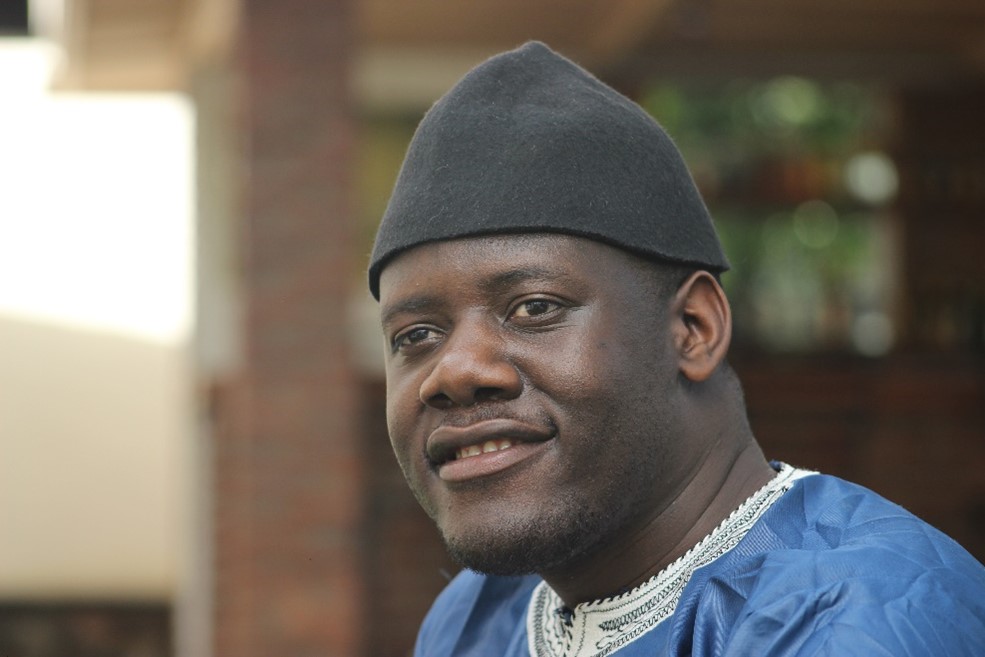
Kenneth Toah Nsah aka Nsah Mala
Since we met him during our ZOOM session, Kenneth, completed his PhD as a Doctoral Researcher and PhD Fellow at the Aarhus University, Denmark in March 2022. He is currently Postdoctoral Research Fellow at Radboud University, Nijmegen, Gelderland, Netherland.
The title of Kenneth’s presentation was “The Congo Basin and Literary Arts”. Kenneth clearly linked local and diverse African languages and cultures to the historic European colonization and subsequent demise of the Congo Basin which contains as rich an environmental diversity of species, plants, etc. as the Brazilian rainforest. He articulated that so often the “southern” regions and specifically the African continent is left out of the discussion as it relates to #ClimateCrisisIsNow. Remember this was December 2021 before COP27 in November 2022, Sharm El Sheikh, Egypt, where financial responsibilities the Global North has for the Global South was a major theme. Towards the end of the webinar, Kenneth graciously read to us some of his own formal published poetry titled “GDP: Gross Destructive Progress”.
At the conclusion of these eight CAPE Webinars there was a great wealth of archived environmental arts and science projects and research that is now available and accessible to all.
The Faroe Islands, June 2022
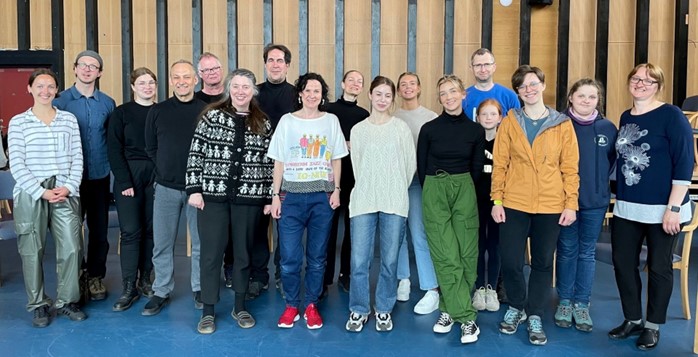
The CAPE Network in Faroe Islands June 2022.
In June 2022, after 25 years of exploration of innovative inter-disciplinary and multi-disciplinary research and practices supported by the Nordic Council of Ministers (together with the Baltic Countries’ support since 2008,) through the Nordplus Higher Education and Nordplus Horizontal programs, the final action of the CAPE Network concluded with a study visit to our CAPE partner institution: the University of the Faroe Islands. The delegation included teachers and students from two Baltic and two Nordic country partners: The Marine Research Institution, Klaipeda University, Klaipeda, Lithuania; the Program in Choreography, the Baltic Film and Media Arts School, Tallinn University; the Arts Academy, Turku University of Applied Sciences, Turku, Finland; and Nord University, Levanger, Norway. The disciplines of Environmental Marine Science, Dance/Choreography, Media Arts, Environmental Arts Education, and Sámi culture were presented by the student and teacher cohort. We were graciously hosted, by Dr. Erla Olsen, Dean, Associate Professor in Biology and Natural Science Didactics. Faculty of Education, the University of Faroe Islands.
One of the gifted Lithuanian students from the Marine Research Institution, Klaipeda University, Livija Lukšaitė, Bachelor student in Biology and Marine Biotechnology, created a Music/Travel Vlog from her experiences during our days in the Faroe Islands. See The Faroe Islands Music/Travel Video, June 5 – 12, 2022.
”All Things Must Pass” (George Harrison)
Although this was the last formal Nordplus for Higher Education CAPE Network activity I led as the network’s coordinator, the future may allow other CAPE Network partners to continue and develop the themes, goals and objectives. The Nordplus for Higher Education staff in Helsinki have been remarkable in the support throughout all these years. The fluidity and ease with the yearly Nordplus grant application process combined with the staff’s expertise and rapid response time to inquiries has been a major contribution to the success of these Arts Academy, Turku University of Applied Sciences’ led Nordplus for Higher Education activities!
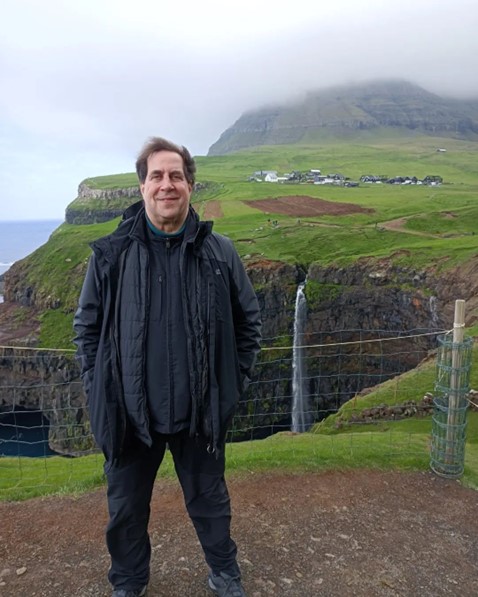
David Yoken.
Over the 25 years we have seen so many collaborative projects between the Nordic and Baltic partner institutions which have positively impacted both the participating students and teachers. Students have found creative professional opportunities that were first explored during their workshop experiences. Teachers and students have found themselves so often “thinking outside of the box”, always finding innovative approaches communicating between/across artistic and scientific disciplines. During these times of being “lost” in our own artistic and scientific learning, Nordplus has truly been the North Star guiding us through unexplored lands to new realizations of what we are able to accomplish together.
References
Yoken, D. (ed.) 2019. NORDPLUS Explorations and Collaborations in the Arts. Commemorative 20th Anniversary Publication. Comments from Turku University of Applied Sciences 100. Turku: Turku University of Applied Sciences. Available: https://julkaisut.turkuamk.fi/isbn9789522167293.pdf.
Nordplus administration 2018. Nordplus and the work of the Programme Committee. Available https://www.nordplusonline.org/wp-content/uploads/2021/05/web-introduction-to-nordplus-and-the-work-of-the-programme-committee-2.pdf.
Below one can find quite detailed documentation regarding the events from three sources: Facebook posts, a student after-action digital portfolio, and a student video documentation:
Alina Heywood, After-Action Digital Portfolio, BA in Media Studies, Arts Academy, Turku University of Applied Sciences. Turku, Finland.
Alina Heywood, Facebook documentation, BA in Media Studies, Arts Academy, Turku University of Applied Sciences. Turku, Finland.
Aneta Varts, Facebook documentation, MA in Choreography, Baltic Film, Media and Arts School, Tallinn University, Tallinn, Estonia.
David Yoken, Facebook documentation, Leon Smith, the Faroe Marine Research Institute’s Head of Technical Department, Captain of the Jákup Sverr, Martin Mohr í Grund
Iida Hakala, Facebook documentation, BA in Media Studies, Arts Academy, Turku University of Applied Sciences, Turku, Finland.
Kari Heimen, Facebook documentation, musician/composer MA student, Nord University, Levanger, Norway.
Livija Lukšaitė, Facebook documentation, BS in Biology and Marine Biotechnology, Marine Research Institute, Klaipeda University, Klaipeda, Lithuania.
Mari Hybertsen Stenberg, Facebook documentation, Preschool-Teacher student, Nord University, Levanger, Norway.
Saulė Medelytė, Facebook documentation, Graduate student in Ecology and Environmental Sciences, Marine Research Institute, Klaipeda University, Klaipeda, Lithuania.
Simo Kruusement, Facebook documentation, MA in Choreography, Baltic Film, Media and Arts School, Tallinn University, Tallinn, Estonia.







